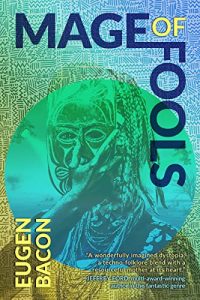Gabino Iglesias Reviews Mage of Fools by Eugen Bacon
 Mage of Fools, Eugen Bacon (Meerkat Press 978-1-94615-484-2, $15.95, 220pp, tp) May 2022. Cover by Tricia Reeks.
Mage of Fools, Eugen Bacon (Meerkat Press 978-1-94615-484-2, $15.95, 220pp, tp) May 2022. Cover by Tricia Reeks.
Eugen Bacon’s Mage of Fools is the kind of too-close-to-reality science fiction narrative that manages to simultaneously awe with its use of language and imagination and serve as a warning of what things could become.
Mafinga used to be a great place to live, a place where free speech and freedom of thought were equally encouraged. Unfortunately, that changed, and Mafinga is now a dystopian place akin to a prison. Jasmin, a young mother of two, is trapped in Mafinga. She spends her days working and lamenting the actions of Mafinga’s dictator, all of which are informed by the dictator’s sorcerer, Atari, a strange being that appeared as if out of nowhere after a bizarre event. Mafinga’s king hates books, stories, and freedom of thought and expression. With Atari’s help, the king has turned Mafinga into a totalitarian state complete with imprisonment of those who oppose him, the elimination of everything he dislikes, the murder of all men to prevent an uprising, and even ongoing executions. In the process, the king and Atari have turned Jamin’s hometown into an inhospitable, almost uninhabitable place devoid of everything she loved. Submerged in darkness, surrounded by oppression, and mourning the death of her husband Godi, Jasmin finds comfort in her children and in Godi’s secret story machine, which she keeps hidden and uses regularly to hear tales of a much better world. Unfortunately, possession of the story machine is punishable by death, so when Jasmin gets caught with it and is whisked away, she’s sure her end is near. Instead of being murdered, Jasmin finds herself working for the queen, who is childless and decides to take Jasmin’s children and treat them as her own. While keeping her life is a welcome surprise, losing her children is more than Jasmin is willing to take, and she will do anything to get her children back.
Mage of Fools is one of those poetic science fiction narratives that pulls readers into a unique world – one Bacon fills with myths, legends, memories, and African elements. However, it’s also the kind of book that feels prescient, like a warning wrapped in a story, which is what some of the best fables are. It’s impossible to put the book down and then read about books getting banned and not see that while Bacon is clearly writing science fiction that takes place in a dystopian future, some of the problems she tackles have deep roots in both contemporary and historical problems. Because of this, the novel becomes more than a story about a mother figuring out how to use the secrets she learns to get her children back; it becomes a call to action that warns readers we all might end up like Jasmin if we don’t pay attention to the slow creeping of dystopian elements into our everyday lives.
While Mage of Fools is a hybrid that’s as much science fiction and dystopian fiction as it is a tale of survival and a celebration of love, what makes it a truly enjoyable and unique reading experience is Bacon’s stylish prose. Bacon’s writing is always elegant, even when discussing unpleasant things, but she occasionally injects what could have otherwise been regular passages with incredible imagery and beautiful language. The result is a story that often reads like a poem and passages that were already crucial becoming even more impressive:
On days such as this, she misses Godi. There are stories in her head, tales of his smell, intricate as a star, luminous in this remembering. There are no myths about his scent, its brightness, positioning or direction. Just the scorching dance of its legend at the end of a long, long night. His touch is a perfect constellation, mummified beyond an autumn sky.
Mage of Fools is about freedom and agency and what happens when we lose those things. Removing men from the narrative allows figures like Godi to become ghosts, while filling the story with smart, strong women. Standing on the shoulders of Bacon’s lyrical prose and its blend of high tech and folklore, this novel soars and helps cement Bacon, an international award winning author, as one of the most distinctive voices in contemporary science fiction.
Gabino Iglesias is a writer, journalist, professor, and book reviewer living in Austin TX. He is the author of Zero Saints and Coyote Songs and the editor of Both Sides. His work has been nominated to the Bram Stoker and Locus Awards and won the Wonderland Book Award for Best Novel in 2019. His short stories have appeared in a plethora of anthologies and his non-fiction has appeared in the New York Times, the Los Angeles Times, and CrimeReads. His work has been published in five languages, optioned for film, and praised by authors as diverse as Roxane Gay, David Joy, Jerry Stahl, and Meg Gardiner. His reviews appear regularly in places like NPR, Publishers Weekly, the San Francisco Chronicle, Criminal Element, Mystery Tribune, Vol. 1 Brooklyn, the Los Angeles Review of Books, and other print and online venues. He’s been a juror for the Shirley Jackson Awards twice and has judged the PANK Big Book Contest, the Splatterpunk Awards, and the Newfound Prose Prize. He teaches creative writing at Southern New Hampshire University’s online MFA program. You can find him on Twitter at @Gabino_Iglesias.
This review and more like it in the June 2022 issue of Locus.
 While you are here, please take a moment to support Locus with a one-time or recurring donation. We rely on reader donations to keep the magazine and site going, and would like to keep the site paywall free, but WE NEED YOUR FINANCIAL SUPPORT to continue quality coverage of the science fiction and fantasy field.
While you are here, please take a moment to support Locus with a one-time or recurring donation. We rely on reader donations to keep the magazine and site going, and would like to keep the site paywall free, but WE NEED YOUR FINANCIAL SUPPORT to continue quality coverage of the science fiction and fantasy field.
©Locus Magazine. Copyrighted material may not be republished without permission of LSFF.






